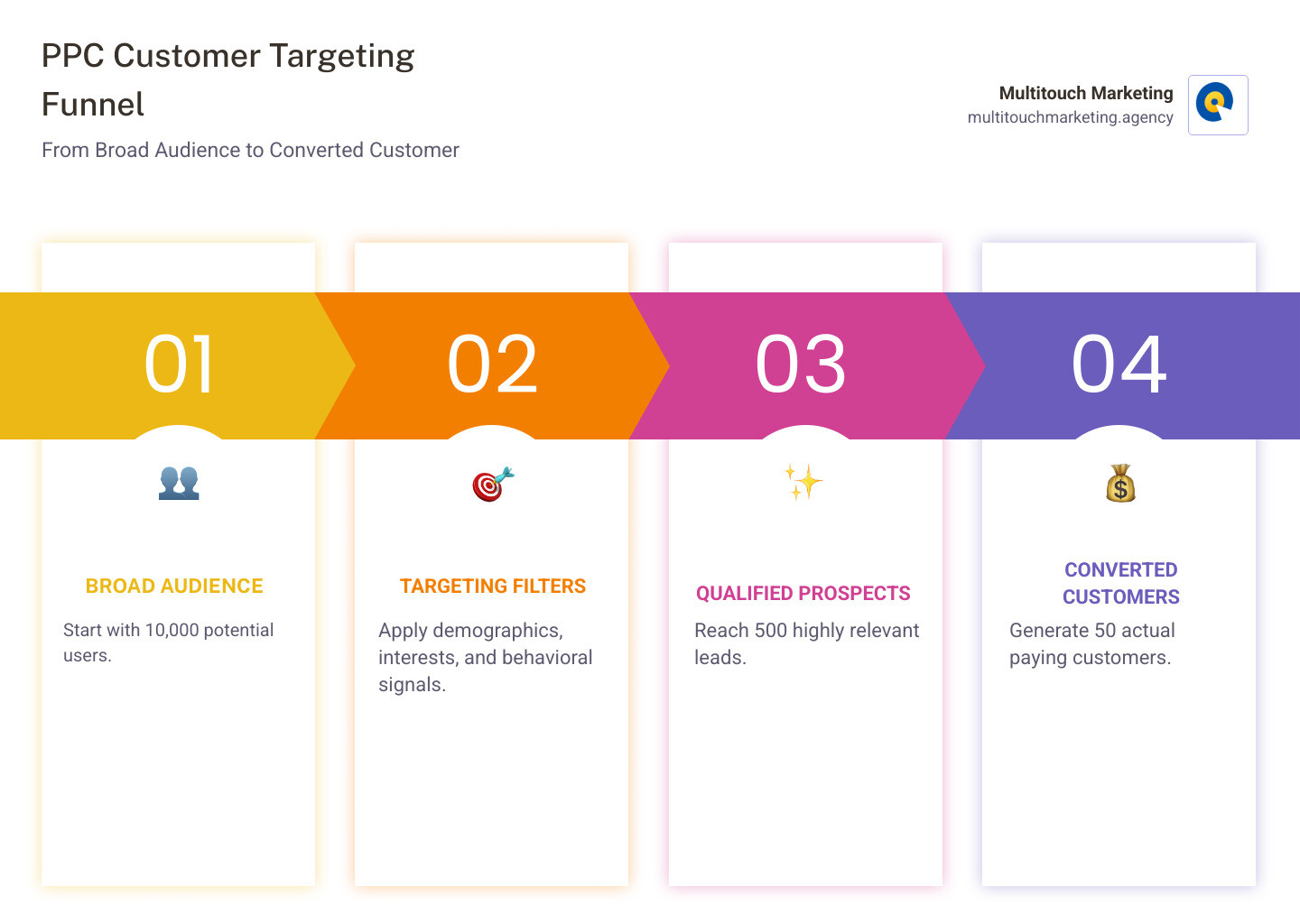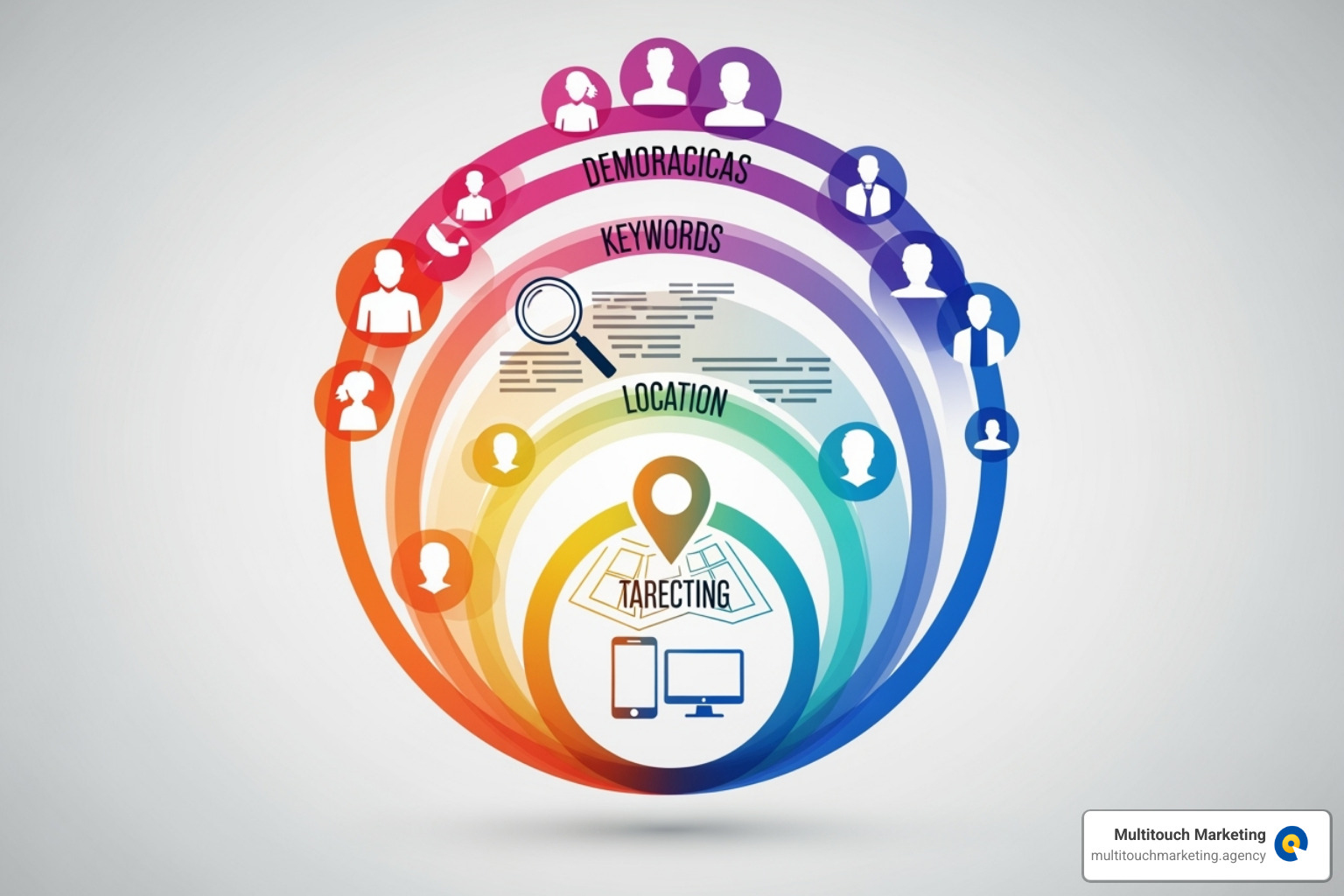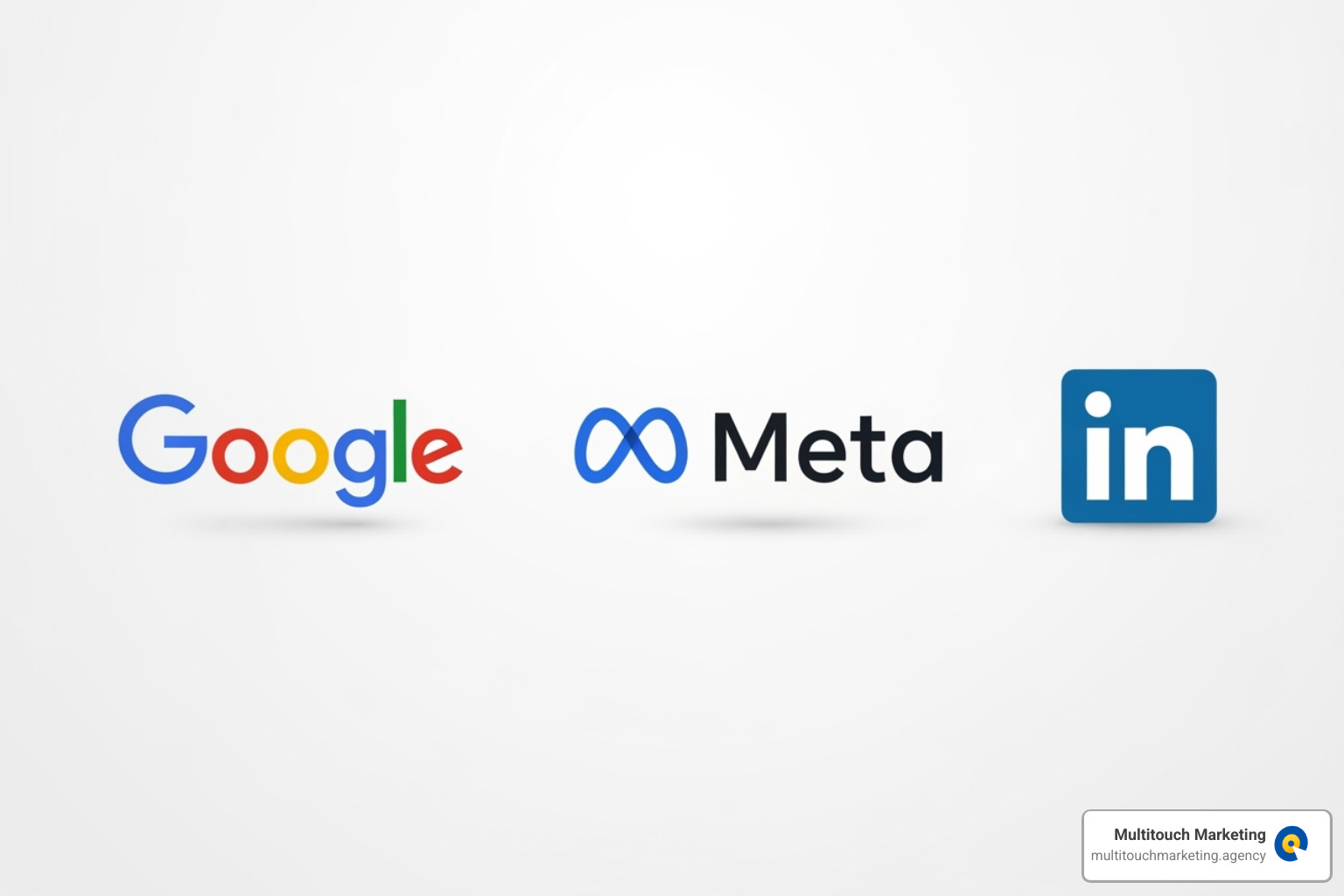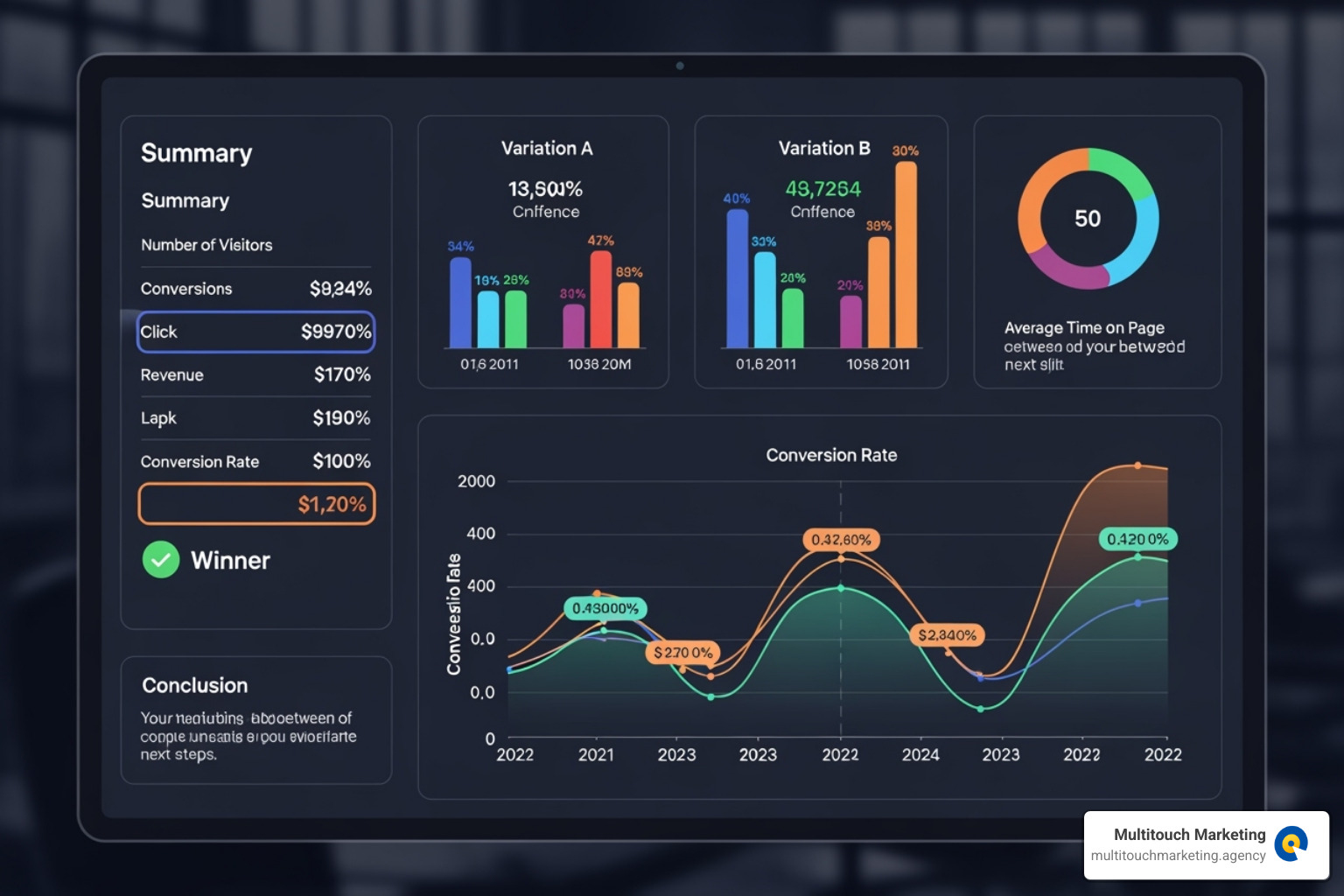Why Precision in PPC Targeting Matters
Targeted PPC ads are campaigns using specific criteria to reach ideal customers with the right message at the right time. Instead of advertising to everyone, you focus your budget on people most likely to convert.
Key components of targeted PPC ads:
- Audience targeting – Demographics, interests, and behaviors
- Keyword targeting – High-intent search terms
- Geographic targeting – Location-based ad delivery
- Device targeting – Desktop, mobile, or tablet optimization
- Contextual targeting – Relevant websites and content
Poor targeting wastes money fast, as you pay for every click, regardless of conversion. With studies showing 92% of first-time website visitors aren’t looking to buy, precision is crucial for reaching the valuable 8% who are.
Smart targeting changes everything. Properly targeted campaigns earn businesses an average of $2 for every $1 spent on Google Ads, and segmented campaigns can boost revenue by 760%. The difference between profit and loss is reaching qualified customers ready to act.
I’m Milton Brown, and since 2008, I’ve managed PPC campaigns across various industries. My experience confirms that targeted PPC ads deliver the highest ROI when precision targeting meets strategic execution.
The Core Components of Targeted PPC Ads
At Multitouch Marketing, we build successful targeted PPC ads on a solid foundation of three building blocks: defining your audience, choosing high-intent keywords, and layering contextual details. These elements are central to our PPC Campaign Strategies and are what separate budget-draining campaigns from business-growing ones.
Defining Your Ideal Customer Profile (ICP)
Effective targeted PPC ads require a deep understanding of your Ideal Customer Profile (ICP), going beyond basic demographics like age and gender. We dig into psychographics: what are your customers’ values, challenges, and motivations?
For example, a Beverly Hills plastic surgeon’s ideal client isn’t just wealthy; they value expertise and discretion. This insight dictates ad copy and placement. We use Social Media Audience Insights and other Data Driven Marketing Strategies to uncover this information. Behavioral data—like site visits, time on page, or abandoned carts—further refines our targeting, allowing us to create ads that resonate deeply.
Mastering Keyword Targeting for High Intent
Not all keywords are equal. We focus on high-intent keywords that signal a readiness to buy. There’s a huge difference between “how to fix a leaky roof” (research) and “emergency roof repair near me” (intent to buy).
We prioritize commercial keywords that lead to conversions. Long-tail keywords (three or more words) are also goldmines, making up 70% of searches and often having higher conversion rates and lower costs. “Luxury rhinoplasty Beverly Hills” is far more specific and valuable than “nose job.”
We strategically use PPC Keyword Match Types and our PPC Negative Keyword Strategy. Negative keywords are crucial for preventing wasted ad spend on irrelevant searches like “DIY” or “free” for a professional service.
Layering Audience and Contextual Targeting
With the audience and keywords set, we add layers for psychic-like relevance. Geographic targeting is vital for local businesses. We can target by city, zip code, or a radius around your location, ensuring a Durham searcher doesn’t see ads for a Charlotte business.
Our Local Business PPC Management strategies rely heavily on this, as 90% of local searches are on mobile, indicating immediate intent. Geofencing takes this further, targeting users in specific locations like a competitor’s store or a trade show. Learn more about Geofence Advertising on Social Media.
Device targeting adapts the ad for the user’s context—a “Call Now” button for mobile users, more detail for desktop. We also layer on audience targeting (in-market, affinity) and placement targeting to ensure your ad appears in the right context. These layers work in concert to create targeted PPC ads that reach the right person at the right moment with the right message.
Platform-Specific Targeting Capabilities
Choosing the right platform for your targeted PPC ads is crucial. Google captures active searchers, Meta creates demand through interest targeting, and LinkedIn connects with business professionals. The best choice depends on your audience and goals. We leverage various Social Media Ad Formats to match your business objectives with each platform’s unique strengths.
Google Ads: Capturing High-Intent Users
Google Ads is the champion for capturing users actively searching for your offerings. With an average 2:1 return, it’s a reliable workhorse.
- Search Network: Places ads directly in search results, ideal for immediate conversions for service businesses in Raleigh or Charlotte.
- Display Network (GDN): Reaches users on websites and apps through contextual and audience targeting, perfect for brand awareness.
- YouTube Ads: Targets users based on viewing habits and interests, enabling powerful visual storytelling.
- Performance Max: Uses Google’s AI in Google Ads to find customers across all its channels.
- Dynamic Search Ads (DSA): Automatically generates ads from your website content to match relevant searches.
Our Google Ads Campaign Management Services use all these features to maximize efficiency.
Meta Ads (Facebook & Instagram): Excelling in Demographic & Interest Targeting
Meta Ads excel at detailed demographic and interest-based targeting, creating demand where it didn’t exist.
- Core Audiences: Define audiences by demographics, interests (like hobbies), and behaviors (like purchase history). The precision is remarkable.
- Custom Audiences: Target existing customers or leads by uploading your own lists, perfect for remarketing or special offers.
- Lookalike Audiences: Meta’s most powerful feature finds new users who share characteristics with your best customers, expanding your reach to highly relevant prospects.
The platform’s strength lies in combining detailed demographic targeting with interest and behavior targeting. Our guide on How to Advertise on Facebook explores this further.
LinkedIn Ads: The Gold Standard for B2B Targeting
For B2B businesses in markets like Raleigh or Charlotte, LinkedIn Ads offers unparalleled precision in targeting professionals.
- Job title, Company size, and Industry targeting: Focus on specific roles (e.g., “Marketing Manager”), company sizes, or industries to eliminate waste.
- Seniority level targeting: Tailor messages to different levels of influence, from entry-level to C-suite.
- Account-Based Marketing (ABM): Serve ads specifically to employees at a list of target companies, ideal for high-value B2B sales.
Understanding these platform differences is key to an effective targeted PPC ads strategy, especially when used together.
Advanced Strategies & Optimization for Targeted PPC Ads
Once the basics are mastered, targeted PPC ads can be transformed into precision marketing machines. At Multitouch Marketing, we know launching a campaign is just the start; the real value comes from ongoing optimization. Our approach to PPC Campaign Optimization treats your campaigns as living systems that need constant refinement.
Supercharging Campaigns with Advanced Targeted PPC Ads
Advanced strategies can dramatically increase your return on investment.
- Remarketing: Since most people don’t buy on their first visit, remarketing keeps your brand in front of warm prospects. Our Set Up Dynamic Remarketing Google Ads service personalizes this further.
- Dynamic Remarketing: Shows visitors the exact products they viewed, turning generic ads into highly relevant reminders.
- Custom & Lookalike Audiences: Uploading your customer lists allows you to re-engage past buyers or find new people who share traits with your best customers. This expands your reach while maintaining precision. Our Advanced PPC Techniques leverage these capabilities for remarkable results.
The Crucial Role of High-Converting Landing Pages
Even the best targeted PPC ads fail without a great landing page. Your ad makes a promise; the landing page must deliver.
- Message Match: The landing page headline and content must directly match the ad’s message.
- Clear Call-to-Action (CTA): Guide visitors with a single, obvious action you want them to take.
- A/B Testing: Constantly test headlines, images, and buttons to improve performance.
- Mobile Optimization: Your page must load quickly and function perfectly on mobile, where most searches occur. Our Responsive Web Design ensures a seamless experience on all devices.
Tools like Build custom landing pages with Landingi can simplify the creation of high-performance pages.
Common Targeting Mistakes to Avoid
Avoiding these common errors can save you thousands.
- Being too broad: Targeting “marketing” instead of “PPC for dentists” wastes money on irrelevant clicks.
- Forgetting negative keywords: Exclude terms like “free,” “cheap,” or “DIY” to filter out users who will never convert.
- One-size-fits-all device strategy: Mobile and desktop users behave differently; tailor your ads and CTAs accordingly.
- Poor geo-targeting: Local businesses must set tight geographic boundaries to avoid paying for clicks from outside their service area.
- Not segmenting remarketing: Tailor messages based on user behavior (e.g., pricing page visitor vs. blog reader).
Our team helps businesses avoid these pitfalls, as detailed in Busting PPC Marketing Myths.
Measuring Success and Adapting to the Future
In targeted PPC ads, guessing is a recipe for disaster. At Multitouch Marketing, we use rigorous performance tracking and forward-thinking strategies to future-proof your campaigns, ensuring you know exactly how well your ads are performing.
Key Metrics for Effective Targeting
We focus on metrics that impact your bottom line, not just vanity numbers:
- Click-Through Rate (CTR): A high CTR (clicks / impressions) indicates your ad copy is relevant and compelling.
- Conversion Rate: The percentage of clicks that result in a desired action (e.g., purchase, lead). This measures targeting and landing page effectiveness.
- Cost Per Acquisition (CPA): The cost to acquire one customer. Our goal is to drive this down while maintaining quality.
- Return On Ad Spend (ROAS): The ultimate measure of profitability (revenue / ad spend). We aim to maximize your ROAS, as explained in our guide on How to Increase Your ROI Through Scientific SEM.
- Quality Score (Google Ads): A 1-10 score on ad relevance. A higher score leads to lower costs and better ad positions.
Adapting to Market Trends and Consumer Behavior
The digital landscape is always evolving, and so must our targeted PPC ads strategies. We stay ahead of key trends:
- AI in PPC: Artificial intelligence is revolutionizing PPC with automated bidding, audience segmentation, and ad copy generation. We leverage AI Digital Marketing Trends and AI in Marketing Analytics to find high-intent users.
- Privacy Changes: The phase-out of third-party cookies increases the importance of first-party data and modeled conversions. Proper setup of Consent Mode and server-side tagging is now crucial.
- AI Overviews (AIO): Google’s AIOs are changing search results. We monitor their impact on CTR and advise shifting budgets to high-intent themes or Local Service Ads (LSAs) for businesses in areas like Raleigh or Chapel Hill.
- Creative Velocity: AI makes it easier to generate and test multiple ad creatives weekly, which platform automation rewards.
Staying agile and informed is paramount to keeping your campaigns effective.
Frequently Asked Questions about Targeted PPC Ads
When businesses explore targeted PPC ads, they often have similar questions. Here are answers to the most common concerns we hear at Multitouch Marketing.
How does PPC targeting complement SEO?
PPC and SEO are a powerful combination. Targeted PPC ads deliver immediate traffic and visibility, which is crucial while your long-term SEO strategy builds authority. The keyword data from PPC campaigns provides invaluable intelligence for refining your Search Engine Optimization strategy. Seeing your brand in both paid and organic results also builds trust and authority with users.
Is PPC targeting suitable for small businesses with limited budgets?
Absolutely. Precision targeting makes targeted PPC ads ideal for small businesses. Instead of competing on expensive, broad keywords, you can focus your budget on highly specific, lower-cost long-tail keywords and geographic areas (e.g., “emergency electrician Raleigh NC”). This specificity attracts customers ready to buy in your service area. As our guides on PPC Management for Small Business show, the answer to “Does PPC Work for Small Businesses” is a resounding yes.
How do I choose the right PPC platform for my business?
The right platform is where your customers spend their time. The choice depends on your audience and business goals.
- B2C businesses, Google Ads is great for capturing active search intent. Meta (Facebook and Instagram) is excellent for reaching audiences based on demographics and interests.
- B2B companies, LinkedIn is the undisputed champion for targeting professionals by job title, company size, and industry.
The best approach is often to test multiple platforms with a small budget to see what works. Our team helps businesses in Raleigh, Durham, and across North Carolina make these choices to ensure ad dollars are spent effectively.
Conclusion: Achieve Maximum Impact with Precision Targeting
The world of targeted PPC ads demands more than just bidding on keywords. As we’ve explored, precision targeting transforms average campaigns into profit-generating machines.
Success starts with a deep understanding of your ideal customer and high-intent keywords. It’s amplified by layering audience and contextual targeting, choosing the right platforms, and using advanced strategies like remarketing and lookalike audiences. However, none of this works without high-converting landing pages that deliver on your ad’s promise.
The digital landscape is always changing. Staying ahead means embracing AI, adapting to privacy shifts, and continuously optimizing based on key metrics like ROAS and CPA. At Multitouch Marketing, we’ve seen this strategic approach transform businesses across North Carolina.
The difference between wasted ad spend and profitable campaigns is hitting the right person, at the right time, with the right message. That’s not luck—it’s strategic targeting.
Ready to stop guessing and start growing? Partner with our Raleigh experts to refine your local SEO and PPC strategy and see what precision targeting can do for your business. Your ideal customers are searching—let’s make sure they find you.





